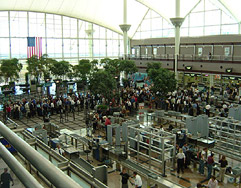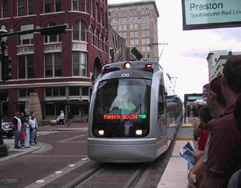Innovation Newsbriefs
Vol. 26, No. 4
In observance of “Infrastructure Week,” May 11-15…
With the deadline to reauthorize the federal surface transportation program just twenty days away, the transportation community has given up hope of seeing Congress extend the program for several years at this time. Instead, they are watching House leaders work on a short term extension to fund the program through the end of the year, as announced by Rep. Paul Ryan (R-WI), chairman of the House Ways and Means Committee. This also seems to be the preferred approach of the Republicans on the Senate Finance Committee and Sen. Jim Inhofe (R-OK), Chairman of the Senate Environment and Public Works Committee.
The decision not to pursue a long term reauthorization should come hardly as a surprise. No one has yet been able to figure out a politically acceptable way to pay for a robust, multiyear transportation bill. And while some lawmakers still pretend to heed lobbyists’ pleas to pass eventually a “sustainable, well-funded” six-year bill, privately they admit that the goal is not achievable in the current tax-averse political environment. Senate Finance Chairman Orrin Hatch put it in clear and simple terms: “We’re not going to get it [a long term reauthorization] without tax increases,” he told reporters, “and I don’t think that’s going to be acceptable to the House. So it’s nice to talk about it, but the reality is that its’ going to be pretty hard to do.”
Just how hard it would be, is a matter of plain arithmetic. To maintain the program at its current spending level would require an extra 15-16 billion each future year according to the Congressional Budget Office (CBO). Thus, to fund a six-year program Congress would need to come up with a staggering $90 billion in general fund subsidies.
Two ways have been proposed to fund this shortfall and both have failed to garner support.
The Obama Administration’s preferred approach — a mandatory 14% tax on accumulated overseas earnings of U.S. companies— has been emphatically declared a “nonstarter” by Sen.Orrin Hatch and Rep. Paul Ryan, the influential Senate and House chairmen of the tax writing committees. While Transportation Secretary Anthony Foxx bravely continues to champion the idea, he is fighting a lonely battle. Not only Congress but also the business community led by US Chamber are firmly opposed to it.
The approach favored by many in the transportation industry—an increase in the federal gas tax—has been ruled out both by the White House and the House Republican leadership. The White House is opposed because a gas tax increase would fall most heavily on those who can least afford it. Speaker John Boehner and House Majority Leader Kevin McCarthy think there just aren’t enough votes in the House to pass it. Both find support for their position in opinion surveys that have consistently shown low levels of public support for a hike in the federal gas tax.
While some observers believe there is still a possibility of eventual progress on a comprehensive tax reform that would help pay for the shortfall in the Highway Trust Fund, the impending expiration of the transportation authorization requires Congress to find a more immediate way of funding the program. Passage of a corporate tax reform bill is at least eight months away, says Rep.Ryan.
Shifting a larger share of funding to the states
With no political concensus on how to fund a $90 billion shortfall, attention has focused on shifting a larger share of funding responsibility to the state and local level. It’s an approach that has been gaining attention not just among fiscal conservatives and congressional Republicans but also with the transportation advocacy group, Transportation for America (T4America) and the influential industry lobby, the American Road and Transportation Builders Association (ARTBA) and its Transportation Investment Advocates Council.
“Prospects of returning to robust national investment are uncertain at best. States that want to continue investing will have to explore new ways to raise funding for transportation on their own,” said T4America’s Director, James Corless in announcing the launch of an initiative to support efforts to raise transportation funding through state legislation.
The desire for more fiscal autonomy resonates in state capitals. Governors and state legislatures of both parties deem the prospect of future federal funding highly uncertain and seek to place their transportation programs on a more stable and predictable footing that is less dependent on the vagaries of federal budgeting.
Also, using local funds enables states to avoid cumbersome federal requirements that add to project costs and delay their implementation. In short, states have a genuine incentive to embrace a more proactive role in funding transportation.
State revenue-raising measures are generating billions of additional dollars
Twenty-three states have taken steps to raise transportation revenue this year (see below). Twelve states have increased their gas tax or sales tax on gasoline since 2014 (seven of them this year), reports ARTBA’s Transportation Investment Advocacy Center which tracks transportation funding initiatives at the state level. (Its latest 2015 State Transportation Funding Initiatives Report can be found at http://www.transportationinvestment.org. See also, T4America’s survey, “State Legislation to Raise Transportation Revenue, http://t4america.org/maps-tools/state-transportation-funding/.)
Other measures include increasing reliance on highway tolls (350 miles of new toll roads have been added since 2011 according to The International Bridge Tunnel and Turnpike Associations ), financing large-scale construction projects with long term credit (TIFIA for example), and entering into public-private partnerships (P3) that utilize private equity capital, “availability payments,” and highway tolling concessions. Nine P3 procurements have closed since 2013 and more are expected in the days ahead, reports Public Works Financing.
While these measures promise to generate billions of additional dollars for state and local transportation programs, state officials are voicing opposition to eliminating federal assistance. “I am not here to endorse devolution of the federal surface transportation program,” said North Carolina’s Governor Patrick McCrory at a March 17 hearing.of the House Transportation and Infrastructure Committee. His fellow witness, Wyoming’s DOT Secretary John Cox, pointed out that while dozens of states have adopted legislation to increase transportation revenue, “they do so expecting to supplement the Federal program—not as a substitute for the Federal program.”
“This is not about devolution”
Still…with state transportation revenue markedly on the rise, many Republicans privately contend that states are in a position to assume more funding responsibility for local infrastructure. This, in turn, allows the Trust Fund revenue to be refocused on programs and issues that are clearly of federal concern or national significance—-such as maintaining and upgrading the Interstate Highway network, fixing aging bridges, modernizing critical transit infrastructure and supporting highway safety and R&D programs.
As advocates of increased state involvement like to point out, this is not “devolution” — a process that has fallen into disfavor because it calls for the abolition or a drastic reduction in the federal gas tax (as embodied in Sen. Mike Lee’s Transportation Empowerment Act.).
“I call this a judicious rebalancing of federal-state funding responsibilities,” a senior Republican lawmaker told reporters. “This does not mean ending federal support …No one is calling for the abolition of the federal gas tax.”
Moreover, such a rebalancing does not necessarily preclude additional revenue. But the question of federal program subsidies, many conservatives contend, should be treated as a separate matter and the rationale for the subsidies and their size reexamined in light of the states’ increased ability to fund local transportation and the congressional budget policies.
Aligning spending with incoming Trust Fund revenue
Those policies have just undergone a reformulation. The House and the Senate have agreed to a budget framework that calls for gradually constraining discretionary spending on transportation and aligning it with incoming revenues from motor vehicle fuel taxes. A concurrent budget resolution—the first joint budget resolution to be approved by Congress since 2009— was passed by the House on April 30 and by the Senate on May 5.
While the budget resolution is not legally binding, it serves to signal a congressional commitment to restrain spending and balance the budget without increasing taxes. It also sets overall spending levels for separate appropriation bills that Congress will vote upon later this year.
(Although the new budget agreement calls for a 20 percent cut in outlays, it gives the authorizing committees flexibility in future legislation to increase budget authority as long as any future general-fund transfers are fully offset. See, Conference Report on Concurrent Resolution on the Budget for Fiscal Year 2016, April 29, 2015). Finding credible offsets is a serious challenge in itself.
As Gov. McCrory testified, the urgent priority is to provide states with funding certainty and continuity to pursue large, capital-intensive infrastructure projects that require funding over multiple years. And this, according to budget analysts, can be effectively accomplished with a multi-year core program funded with the annual Highway Trust Fund revenue.
The Congressional Budget Office projects a stable and predictable stream of fuel tax revenue of $40 billion per year well into the future — putting to rest the misleading notion that the Trust Fund is “going broke,” becoming “insolvent” or “running out of cash.” An annual $40 billion federal-aid transportation budget, extending over a period of six to ten years, would go a long way toward restoring and improving the nation’s core transportation infrastructure, claim independent analysts.
In sum, concentrating Highway Trust Fund revenue on programs of clear national interest while letting states assume more responsibility for local transportation could lead to a long lasting solution to the transportation funding crisis.
And, importantly, it’s an approach that resonates among Republicans on Capitol Hill.
…
The “Can-Do” States
At press time, the following states have taken steps to raise transportation revenue this year:
New York: Gov. Andrew Cuomo proposed $4.2 billion for transportation investments as he began his second term; Florida: Gov. Rick Scott proposed $9.9 billion for transportation (over $4 billion for roads and bridges) in his 2015 budget request to the state legislature; North Carolina: Gov.Pat McCrory proposed a $1.2 billion bond issue to as part of a 25-year transportation vision plan to improve intra-state connectivity and reduce congestion. California: Assembly Speaker Toni Atkins announced legislation to raise an additional $2 billion a year for transportation through an annual $52 vehicle registration fee. Connecticut: State legislators unveiled a 30-year $37.4 billion transportation plan to be financed through bonds. The plan is is intended to support Gov. Dannel Malloy’s long-term transportation proposal. North Dakota: Gov. Jack Dalrymple signed into law a bill that will provide $450 million for state highway impovments. Another bill, known as the Surge Funding Bill will dedicate $1.1 billion from the state’s Strategic Investment and Improvement Fund for critical infrastructure projects; Washington: The state Senate passed a $15 billion transportation revenue measure that includes an incremental gas tax increase of $11.7 cents over three years. “The current plan is the most positive movement that we’ve seen on transportation in this state for many, many years,” said Sen. Joe Fain, Vice chairman of the Senate Transportation Committee. Iowa: Iowa legislature approved a 10-cent per gallon gas tax increase The increase will allow $700 million in spending on state highway projects and $200 million in local projects annually. The Iowa House passed a $365.2 million transportation bill. Georgia: the Georgia House of Representatives approved a bill that would replace the state existing sales tax on gasoline with a 21.7 cents-per-gallon state gas tax increase and index it to the CPI. The bill would also provide a large bond package for transportation. Utah: The state legislature passed a bill that will increase the gas tax by 5 cents-per-gallon, add a 12 percent tax on the wholesale price of gasoline and permit counties to seek voter approval for a local sales tax for local transportation projects. South Dakota: The state legislature approved a fuel tax increase of 6 cents per gallon; the bill also raises vehicle license fees and gives local governments authority to levy their own road improvement fees. The measure is expected to generate over $80 million/year for state and local programs. Montana: a bipartisan group of state senators introduced a bill that calls for spending $50 million in cash and $50 million in bond proceeds over two years on infrastructure. If state revenue receipts exceeded a certain trigger, the authorized amounts could rise as high as $100 million in cash and $100 million in bond proceeds.Ohio: The House-Senate conference committee approved a $7 billion transportation budget for the next two years and sent the bill to the Governor. Texas: The House Appropriation Committee approved a $209.8 billion two-year budget proposal for transportation. The proposal would spend $7.7 billion more than the current two-year budget. Nebraska: The Nebraska legislature approved a 6-cent/gallon gas tax increase over the next four years, eventually expected to generate $76 million annually. Tennessee: Gov. Bill Haslam released a three-year transportation program featuring $1.2 billion in infrastructure investments. The program reflects the state’s commitmernt to remain debt-free, Haslam said. The budget ensures that projects already underway won’t be negatively impacted by decisions out of Washington, he added. Mississippi: The state legislature voted to raise $200 million in bond financing to pay for transportation improvements, most of them targeted at structurally deficient bridges. The measure takes effect July 1. DOT Secretary Melinda McGrath linked the legislature’s action to lack of action by Congress. Idaho: the Idaho legislature passed a compromise $94.1 million transportation bill funded with a 7-cent increase in the fuel tax and vehicle registration fees. South Carolina: The South Carolina House approved a measure that will provide at least $370 million for transportation projects, primarily through a new six percent tax on wholesale gasoline. A competing Senate bill would generate $800 million through a gas tax increase. Minnesota: The Minnesota House approved a $7 billion, 10-year transportation plan.The bill takes $300 million each year in existing sales tax revenue now spent on general spending. The Senate is working on its own bill. Georgia: Georgia Governor Nathan Deal signed into law a bill that will increase transportation funding by $900 million per year through increases in fuel taxes and vehicle fees. Georgia thus joins Idaho, Iowa, South Dakota and Utah to have increased their gas tax to generate recurring transportation revenue. The measure also allows local governments to increase transportation-related taxes. Atlanta voters approved a $188 million transportation infrastructure bond. Missouri: the Missouri State senate endorsed a bill that would raise the gas tax by 1.5 cents/gallon (3.5 cents for diesel). This would be the first gas tax increase in nearly 20 years. Louisiana: The House Ways and Means Committee approved a Democratic-sponsored one-cent sales tax increase and a 10-cent gasoline tax increase that “could pour billions into transportation improvements over the next decade.” according to press reports. Kansas: A gas tax hike, possibly of five to ten cents, is under discussion in the House committee, according to press reports
Sources: ARTBA’s 2015 State Transportation Funding Initiatives Report; T4America’s survey, “State Legislation to Raise Transportation Revenue; NCSL State Bill Database; Council of State Governments’ “State Data;” AASHTO Daily Transportation Update.
…
C. Kenneth Orski is a public policy consultant and former principal of the Urban Mobility Corporation. He has worked professionally in the field of transportation for over 30 years, in both the public and private sector. He is editor and publisher of Innovation Newsbriefs, now in its 26th year of publication.
Tags: C. Kenneth Orski, CBO, Innovation Newsbriefs, Ken Orski, Reauthorization






 RSS Feed
RSS Feed